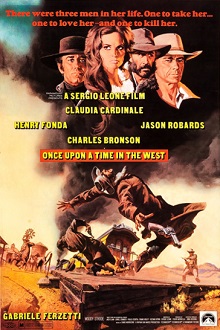| Once Upon a Time in the West | |
|---|---|
 Theatrical release poster by Frank McCarthy | |
| Directed by | Sergio Leone |
| Screenplay by |
|
| Story by |
|
| Produced by | Fulvio Morsella |
| Starring | |
| Cinematography | Tonino Delli Colli |
| Edited by | Nino Baragli |
| Music by | Ennio Morricone |
Production companies | |
| Distributed by |
|
Release dates |
|
Running time |
|
| Countries | |
| Language | Italian
|
| Budget | $5 million |
| Box office | $5.3 million (United States) 40 million tickets (worldwide) |
Once Upon a Time in the West (Italian: C'era una volta il West, "Once upon a time (there was) the West") is a 1968 epic spaghetti Western film directed by Sergio Leone, who co-wrote it with Sergio Donati based on a story by Dario Argento, Bernardo Bertolucci and Leone. It stars Henry Fonda, cast against type as the villain,[5][6] Charles Bronson as his nemesis, Jason Robards as a bandit and Claudia Cardinale as a newly widowed homesteader. The widescreen cinematography was by Tonino Delli Colli and the acclaimed film score was by Ennio Morricone.
After directing The Good, the Bad and the Ugly, Leone decided to retire from Westerns and aimed to produce his film based on the novel The Hoods, which eventually became Once Upon a Time in America. However, Leone accepted an offer from Paramount Pictures providing Henry Fonda and a budget to produce another Western. He recruited Bertolucci and Argento to devise the plot of the film in 1966, researching other Western films in the process. After Clint Eastwood turned down an offer to play the movie's protagonist, Bronson was offered the role. During production, Leone recruited Donati to rewrite the script due to concerns over time limitations.
The original version by the director was 165 minutes when it was first released on December 21, 1968. This version was shown in European cinemas, and was a box-office success. For the US release on May 28, 1969, Once Upon a Time in the West was edited down to 140 minutes by Paramount and was a financial flop.
The film is the first installment in Leone's Once Upon a Time trilogy, followed by Duck, You Sucker! and Once Upon a Time in America, though the films do not share any characters in common.[7]
In 2009, the film was selected for preservation in the United States National Film Registry by the Library of Congress as being "culturally, historically, or aesthetically significant".[8][9] The film is regarded as one of the greatest Westerns of all time and one of the greatest films of all time.[10][11][12]
- ^ a b c d e "Once Upon a Time in the West". AFI Catalog of Feature Films. Archived from the original on October 15, 2017. Retrieved October 21, 2018.
- ^ a b c d e f "Once upon a Time in the West (1968)". British Film Institute. Archived from the original on October 21, 2018. Retrieved October 21, 2018.
- ^ a b c "Film Releases". Variety Insight. Archived from the original on October 18, 2018. Retrieved October 21, 2018.
- ^ a b "C'era una volta il West". Lumiere. Archived from the original on October 21, 2018. Retrieved October 21, 2018.
- ^ Corliss, Richard (April 25, 2007). "Top 25 Greatest Villains – Henry Fonda as Frank". Time. Archived from the original on April 11, 2016. Retrieved April 8, 2016.
- ^ "Henry Fonda Talks about his casting in Once Upon A Time in the West". YouTube. July 11, 2007. Archived from the original on April 27, 2021. Retrieved April 27, 2021.
- ^ "The film with three names – in praise of Sergio Leone's neglected spaghetti western". British Film Institute. April 24, 2018. Archived from the original on June 2, 2019. Retrieved June 2, 2019.
- ^ "25 new titles added to National Film Registry". Yahoo News. Yahoo. Associated Press. December 30, 2009. Archived from the original on January 6, 2010. Retrieved December 30, 2009.
- ^ "Complete National Film Registry Listing". Library of Congress. Archived from the original on May 7, 2016. Retrieved May 7, 2020.
- ^ Ellison, Christine (May 9, 2011). "The 100 Greatest Westerns of All Time". American Cowboy. Archived from the original on March 4, 2023. Retrieved March 4, 2023.
- ^ Phipps, Keith (March 24, 2022). "The 50 Greatest Western Movies Ever Made". Vulture. Archived from the original on January 29, 2021. Retrieved March 4, 2023.
- ^ "The Greatest Films of All Time". BFI. Archived from the original on March 18, 2021. Retrieved March 4, 2023.